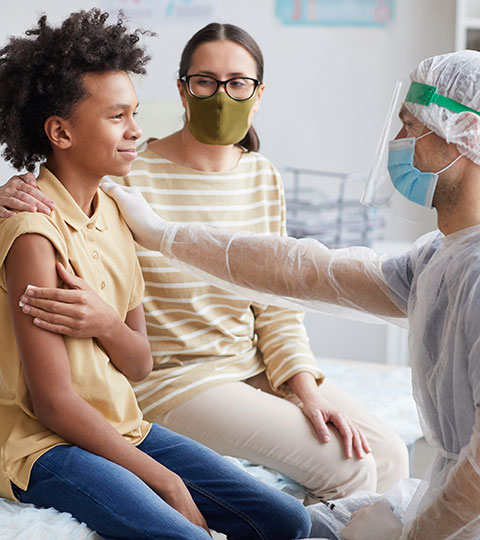Parents/Guardians – Do you have questions or concerns about vaccinating your child?
You are strongly encouraged to talk to your child’s health care provider when making a decision about vaccination. By discussing with a health care provider, you will get the facts about COVID-19 vaccination from a reliable source.
In addition, there are FREE vaccine consultation services available to answer any questions or concerns you may have.

SickKids Vaccine Support Line:
This free service is available to children, youth, and their families across Ontario. The SickKids COVID-19 Vaccine Consult Service is a by-appointment phone service that provides a safe, judgement-free space to have a one-to-one, open conversation about the COVID-19 vaccine for children and youth with a paediatric registered nurse.
You do not need an OHIP card to participate. Over the phone interpretation is free and available in many languages. Appointments can be made online or by calling 437-881-3505 or 1-888-304-6558.
VaxFacts with Scarborough Health:
This service provides one-to-one phone consultation, facts, and a judgement-free conversation to help you make an informed decision. Any family in Ontario can book an appointment online to connect with qualified doctors or register by phone by calling 416-438-2911 ext. 5738.
You do not need an OHIP card to participate. Over the phone interpretation is free and available in 200 languages.
Frequently Asked Questions
About the COVID-19 Vaccine for Children Ages 6 Months to 4 Years
COVID-19 vaccines, like all medicines, can cause side effects, although not everyone gets them. The most frequently reported short-term side effects for children following the COVID-19 vaccine include redness and pain at injection site, fatigue, headache, chills, muscle aches and loss of appetite. These side effects are typically mild to moderate and on average did not last longer than three days.
The benefits of getting vaccinated and being protected against COVID-19 far outweigh the risks of any side effects from the vaccine. COVID-19 infection may cause longer-lasting symptoms and health problems for some people, including children, which is why it’s important that children get vaccinated as soon as possible.
Not all children have only mild symptoms. Vaccination is the preferred and safest method to provide additional protection for all children, including those aged six months to under five years. Having children vaccinated also provides further protection to their family members, especially if they have family members who are at risk for more severe illness.
Even if a child has already had COVID-19, vaccination is still important. While infection alone provides some protection, vaccination after infection helps further improve the immune response. Studies in adults show that vaccination following infection provides stronger and longer-lasting protection. Vaccination remains one of the most effective ways for individuals to protect themselves, their families and their communities against severe outcomes from COVID-19.
No. The paediatric vaccines are a lower dose than the paediatric vaccines used for children aged five to 11, as younger children need a lower dose of the vaccine to get the same protection from COVID-19.
Vaccine certificates with QR codes will be available to download from the COVID-19 vaccination portal and notification will be sent to the contact email, if provided, when the record of vaccination is available to parents or guardians for children aged six months to under five years.
The COVID-19 vaccine is voluntary for everyone eligible in the province. In Ontario, the Health Care Consent Act sets out certain rules on when consent is needed for treatment and how it must be obtained.
Parents or legal guardians of children aged six months to under five years need to provide informed consent on behalf of the child before or at the time of the appointment. This means that they must understand what the vaccine involves (for example, how it is administered), why it is recommended, and the potential risks and benefits.
Children between six months to under five years of age can receive their vaccination at participating pharmacies and health care providers. We encourage parents and guardians to reach out to their health care provider to book an appointment.
The Windsor-Essex County Health Unit is also offering limited appointments at the Windsor office for this age group. Appointments can be booked online, or by calling 519-258-2146 ext. 4500.
COVID-19 Vaccine Q&A:
Why is it important for children aged 5-11 to get vaccinated?
Watch the full ‘COVID-19 Vaccine Q&A with Ontario’s Medical Professionals’ YouTube series for more answers to commonly asked questions about the COVID-19 vaccine for children.
Dosage: A dose of the paediatric Pfizer-BioNTech vaccine for young children, between ages 5 and 11, contains one-third (10 micrograms) of the amount of active ingredient compared to the adult dose (30 micrograms). COVID-19 vaccine dosages do not vary by patient weight but by age on the day of vaccination. In clinical trials, lower doses provided children with very good protection against COVID-19.
Interval: Children aged 5 to 11 years getting the vaccine should receive 2 doses. The National Advisory Committee on Immunization recommends that the second dose should be given at least 8 weeks after the first dose.
The benefits of limiting the number of cases of COVID-19 far outweigh any potential risks associated with vaccination. In fact, serious side effects after receiving the COVID-19 vaccine, such as allergic reactions, are extremely rare.
Similar to when children receive other vaccines, some children may develop short-term and mild side effects after receiving a COVID-19 vaccine. Experiencing mild side effects, such as pain where the needle was given, tiredness, chills, headache, and muscle pain can be expected and indicates that the vaccine is working to produce protection or immunity. These side effects should go away in a few days.
Preparing Your Child for Vaccination
Become familiar with latest information about the COVID-19 vaccine before having a conversation with your child. Have an open discussion, ask your child what they’ve heard about the vaccine and listen to their responses, and be honest when answering questions they may have. The following resources provide more tips about speaking with your child about the COVID-19 vaccine:
- COVID-19 Vaccine Q&A with Ontario’s Health Professionals: How do I make my child comfortable about getting the COVID-19 vaccine? Watch on YouTube.
- Resource from UNICEF
The fear of needles is very common in both adults and children. If your child’s fear is so great that it stops them from getting needles, then they may have a condition known as needle phobia. Help your child cope with getting a needle by staying calm, focusing on the positive, not focusing on the negative, making positive coping statements, and offering distractions.
Sometimes, the fear of needles is so great it may cause a person to feel faint. Ask your child to lie down for the vaccination, and to stay lying down for several minutes after the injection before slowly getting up.
Many people have a fear of needles yet still successfully received the COVID-19 vaccine and other vaccines. Below are some needle and vaccination fear resources to help you!
COVID-19 Vaccine Q&A with Ontario’s Health Professionals: My child is afraid of needles. What can I do to help? Watch on YouTube.
The CARD System - Affiche du système CARD
The CARD System Poster - Activité avec le système CARD
SickKids: The Ask CARD – The CARD system for a better vaccination experience
Why should youth get vaccinated?
Having youth vaccinated will further limit the opportunity for this virus to spread.
Even if you are young and in good health, the COVID-19 virus could still have life-threatening complications or long-term side effects. There is no way to tell how the COVID-19 infection may affect you. People who are fully vaccinated are more likely to have mild or no symptoms.
The vaccine is a safe and effective way to help reduce the spread of COVID-19 in Windsor and Essex County and help our community get back to life before the pandemic.
It is recommended that a parent or guardian attend the vaccination appointment with anyone under 16 years of age.

Is the COVID-19 Vaccine Safe & Effective?
The COVID-19 vaccine was rigorously tested in youth confirming that it is safe and effective in people aged 12 to 17.
The benefits of limiting the number of cases of COVID-19 far outweigh any potential risks associated with vaccination. In fact, serious side effects after receiving the COVID-19 vaccine, such as allergic reactions, are extremely rare.
The COVID-19 vaccine helps build up immunity to the virus, so that your body will fight it off more easily. This can reduce the risk of getting sick from COVID-19 or make symptoms milder if you do get it.
It is very important that you complete a primary vaccination series (2 doses), and continue to stay up to date with your COVID-19 vaccinations, to protect yourself as much as possible against COVID-19.
COVID-19 vaccines are only provided if informed consent is received from the person to be vaccinated. This applies to those aged 12 to 17, and as long as you have the capacity to make this decision. This means that you understand:
- what vaccination involves,
- why it is being recommended; and
- the risks and benefits of accepting or refusing to be vaccinated.
Even if you are able to provide informed consent, it would be a good idea to talk about this decision with your parent/guardian or an adult you trust such as your principal or a teacher. If you are not able to consent to receiving the vaccine, you require consent from your substitute decision-maker, such as your parent or legal guardian.
COVID-19 vaccines, like all vaccines, may cause side effects, though not everyone experiences them. Most who experience side effects report mild side effects within the first 1-2 days after vaccination. The most commonly reported side effects after receiving a COVID-19 vaccine include pain, swelling at the injection site, tiredness, headache, muscle pain, joint pain, chills, and mild fever.
Watch the COVID-19 Vaccine Q&A with Ontario Health Professionals on YouTube: Should I be worried about myocarditis if my child receives the COVID-19 vaccine?
Additional Resources
- Ministry of Ontario: COVID-19 vaccines
- Ministry of Ontario: COVID-19 Vaccines for Children and Youth Factsheet (FR)
- Pediatricians of Ontario: Is the COVID-19 Vaccine Safe for Kids?
- Connectability: COVID-19 resources for individuals with developmental disabilities, families and caregivers


